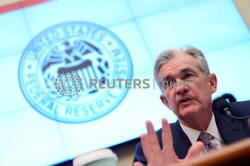U.S. economic growth seen slowing in second quarter
 Send a link to a friend
Send a link to a friend
 [July 26, 2019] By
Lucia Mutikani [July 26, 2019] By
Lucia Mutikani
WASHINGTON (Reuters) - The U.S. economy
likely grew at its slowest pace in more than two years in the second
quarter as an acceleration in consumer spending was probably offset by
weak exports and business investment.
The anticipated moderation in growth will come against the backdrop of
rising risks to the economy's outlook, especially from a trade war
between the United States and China as well as slowing growth overseas,
which are seen encouraging the Federal Reserve to cut interest rates
next Wednesday for the first time in a decade.
With a strong labor market supporting consumer spending, a recession is,
however, not on the horizon. The Commerce Department will publish the
second-quarter gross domestic product (GDP) report on Friday at 8:30
a.m. EDT (1230 GMT).
"The slowing in the economy spooked the Fed and markets, but the sky is
not falling," said Ryan Sweet, a senior economist at Moody's Analytics
in West Chester, Pennsylvania. "If we do get a recession next year it
would be because we shot ourselves in the foot with the trade tensions."

Gross domestic product probably increased at a 1.8% annualized rate in
the second quarter, also because of a smaller inventory build, according
to a Reuters survey of economists, after surging at a 3.1% pace in the
January-March period.
But with the volatile exports and inventory categories accounting for
much of the expected step-down in GDP, the slowest growth pace since the
first quarter of 2017 will likely mask some underlying strength in the
10-year economic expansion, the longest in history.
The survey was completed before the release of June wholesale and retail
inventories as well as durable goods and goods trade deficit data, which
led the Atlanta Fed to cut its forecast by three-tenths of a percentage
point to a 1.3% rate.
The economy is slowing largely as the stimulus from the White House's
$1.5 trillion tax cut package fades. The tax cuts together with more
government spending and deregulation were part of measures adopted by
the Trump administration to boost annual economic growth to 3.0% on a
sustained basis.
The economy grew 2.9% in 2018 and growth this year is expected to be
around 2.5%. Economists estimate the speed at which the economy can grow
over a long period without igniting inflation at between 1.7% and 2.0%.
"As the benefits of fiscal stimulus fade and trade policy uncertainty
and slowing global demand remain headwinds to business investment, U.S.
GDP growth should moderate," said Sam Bullard, a senior economist at
Wells Fargo Securities in Charlotte, North Carolina.
The GDP report is also expected to show a pickup in inflation last
quarter, but the overall trend likely remained benign. The government
will also publish revisions to GDP data from 2014 through the first
quarter of 2019.
STRONG CONSUMER SPENDING
Growth in consumer spending, which accounts for more than two-thirds of
U.S. economic activity, is expected to have surged after slowing to a
0.9% rate in the first quarter, the weakest in a year. Some of the
slowdown in consumer spending early in the year was blamed on a 35-day
partial shutdown of the government. Spending is being supported by the
lowest unemployment rate in nearly 50 years, which is lifting wages.
[to top of second column] |

Federal Reserve Chairman Jerome Powell testifies during a House
Financial Services Committee hearing on "Monetary Policy and the
State of the Economy" in Washington, U.S. July 10, 2019.
REUTERS/Erin Scott/File Photo

The jump in consumer spending was, however, likely blunted by a sharp
drop in exports, in a reversal of the strong growth experienced in the
first quarter. Weak exports are expected to have resulted in the
deterioration of the trade deficit in the second quarter. Trade is
believed to have subtracted from GDP growth last quarter after
contributing 0.94 percentage point in the January-March period.
The acceleration in consumer spending likely helped businesses to
whittle down an inventory overhang, resulting in a smaller inventory
build. While that probably weighed on GDP growth in the second quarter,
it is a potential boost to manufacturing. Businesses have been placing
fewer orders with factories while working through stockpiles of unsold
goods, which contributed to undercutting manufacturing production.
Business investment was probably weak in the second quarter, with
spending on equipment expected to have contracted again after declining
at its steepest pace in three years in the January-March period.
Fed Chairman Jerome Powell early this month flagged business investment
as one area of weakness in the economy, noting it had "slowed notably,"
and that this might "reflect concerns about trade tensions and slower
growth in the global economy."
Design problems at aerospace giant Boeing <BA.N> have hurt business
investment, with some spillover to exports.
Boeing reported its biggest-ever quarterly loss on Wednesday due to the
spiraling cost of resolving issues with its 737 MAX airplane and warned
it might have to shut production of the grounded jet completely if it
runs into new hurdles with global regulators to getting its best-selling
aircraft back in the air.
The plane was grounded worldwide in March after two fatal crashes in
Ethiopia and Indonesia. Production of the aircraft has been reduced and
deliveries suspended. Economists estimate the 737 MAX troubles cut at
least two-tenths of a percentage point from GDP growth in the second
quarter.
"There could be more noticeable effects on various growth components,
with weakness in related equipment spending and exports and a partially
offsetting increase in inventories," said Daniel Silver, an economist at
JPMorgan in New York.

Business spending on structures, which include oil and gas well
drilling, is expected to have declined last quarter. Spending on
intellectual products, including research and development, likely
increased.
Strong growth in government investment is expected, but spending on
homebuilding likely contracted for a sixth straight quarter.
(Reporting by Lucia Mutikani; Editing by Andrea Ricci)
[© 2019 Thomson Reuters. All rights
reserved.] Copyright 2019 Reuters. All rights reserved. This material may not be published,
broadcast, rewritten or redistributed.
Thompson Reuters is solely responsible for this content. |